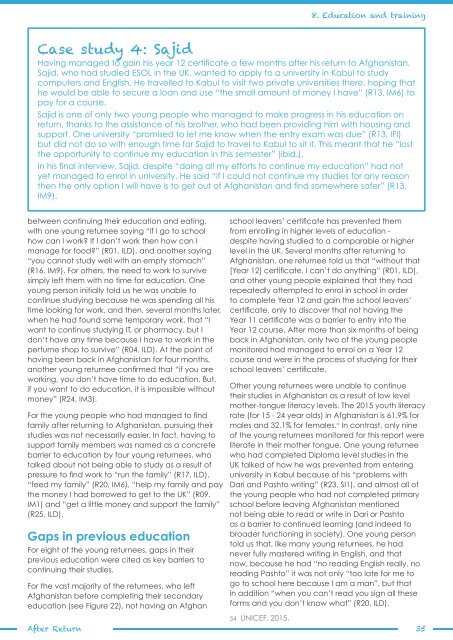After Return
After%20Return_RSN_April%202016
After%20Return_RSN_April%202016
You also want an ePaper? Increase the reach of your titles
YUMPU automatically turns print PDFs into web optimized ePapers that Google loves.
8. Education and training<br />
Case study 4: Sajid<br />
Having managed to gain his year 12 certificate a few months after his return to Afghanistan,<br />
Sajid, who had studied ESOL in the UK, wanted to apply to a university in Kabul to study<br />
computers and English. He travelled to Kabul to visit two private universities there, hoping that<br />
he would be able to secure a loan and use “the small amount of money I have” (R13, IM6) to<br />
pay for a course.<br />
Sajid is one of only two young people who managed to make progress in his education on<br />
return, thanks to the assistance of his brother, who had been providing him with housing and<br />
support. One university “promised to let me know when the entry exam was due” (R13, IFI)<br />
but did not do so with enough time for Sajid to travel to Kabul to sit it. This meant that he “lost<br />
the opportunity to continue my education in this semester” (ibid.).<br />
In his final interview, Sajid, despite “doing all my efforts to continue my education” had not<br />
yet managed to enrol in university. He said “if I could not continue my studies for any reason<br />
then the only option I will have is to get out of Afghanistan and find somewhere safer” (R13,<br />
IM9).<br />
between continuing their education and eating,<br />
with one young returnee saying “if I go to school<br />
how can I work? If I don’t work then how can I<br />
manage for food?” (R01, ILD), and another saying<br />
“you cannot study well with an empty stomach”<br />
(R16, IM9). For others, the need to work to survive<br />
simply left them with no time for education. One<br />
young person initially told us he was unable to<br />
continue studying because he was spending all his<br />
time looking for work, and then, several months later,<br />
when he had found some temporary work, that “I<br />
want to continue studying IT, or pharmacy, but I<br />
don’t have any time because I have to work in the<br />
perfume shop to survive” (R04, ILD). At the point of<br />
having been back in Afghanistan for four months,<br />
another young returnee confirmed that “if you are<br />
working, you don’t have time to do education. But,<br />
if you want to do education, it is impossible without<br />
money” (R24, IM3).<br />
For the young people who had managed to find<br />
family after returning to Afghanistan, pursuing their<br />
studies was not necessarily easier. In fact, having to<br />
support family members was named as a concrete<br />
barrier to education by four young returnees, who<br />
talked about not being able to study as a result of<br />
pressure to find work to “run the family” (R17, ILD),<br />
“feed my family” (R20, IM6), “help my family and pay<br />
the money I had borrowed to get to the UK” (R09,<br />
IM1) and “get a little money and support the family”<br />
(R25, ILD).<br />
Gaps in previous education<br />
For eight of the young returnees, gaps in their<br />
previous education were cited as key barriers to<br />
continuing their studies.<br />
For the vast majority of the returnees, who left<br />
Afghanistan before completing their secondary<br />
education (see Figure 22), not having an Afghan<br />
school leavers’ certificate has prevented them<br />
from enrolling in higher levels of education -<br />
despite having studied to a comparable or higher<br />
level in the UK. Several months after returning to<br />
Afghanistan, one returnee told us that “without that<br />
[Year 12] certificate, I can’t do anything” (R01, ILD),<br />
and other young people explained that they had<br />
repeatedly attempted to enrol in school in order<br />
to complete Year 12 and gain the school leavers’<br />
certificate, only to discover that not having the<br />
Year 11 certificate was a barrier to entry into the<br />
Year 12 course. <strong>After</strong> more than six months of being<br />
back in Afghanistan, only two of the young people<br />
monitored had managed to enrol on a Year 12<br />
course and were in the process of studying for their<br />
school leavers’ certificate.<br />
Other young returnees were unable to continue<br />
their studies in Afghanistan as a result of low level<br />
mother-tongue literacy levels. The 2015 youth literacy<br />
rate (for 15 - 24 year olds) in Afghanistan is 61.9% for<br />
males and 32.1% for females. 54 In contrast, only nine<br />
of the young returnees monitored for this report were<br />
literate in their mother tongue. One young returnee<br />
who had completed Diploma level studies in the<br />
UK talked of how he was prevented from entering<br />
university in Kabul because of his “problems with<br />
Dari and Pashto writing” (R23, SI1), and almost all of<br />
the young people who had not completed primary<br />
school before leaving Afghanistan mentioned<br />
not being able to read or write in Dari or Pashto<br />
as a barrier to continued learning (and indeed to<br />
broader functioning in society). One young person<br />
told us that, like many young returnees, he had<br />
never fully mastered writing in English, and that<br />
now, because he had “no reading English really, no<br />
reading Pashto” it was not only “too late for me to<br />
go to school here because I am a man”, but that<br />
in addition “when you can’t read you sign all these<br />
forms and you don’t know what” (R20, ILD).<br />
54 UNICEF. 2015.<br />
<strong>After</strong> <strong>Return</strong> 35


